Reuters journalist killed in Russian strike; Telegram founder detained
A member of a media team covering the war in Ukraine has been killed as French police continue to question the founder of controversial app Telegram.
World
Don't miss out on the headlines from World. Followed categories will be added to My News.
A safety adviser working for Reuters was killed in a missile strike on a hotel in eastern Ukraine, the global news agency said, as Kyiv claimed further advances into Russia’s Kursk region.
Ukraine meanwhile accused neighbouring Moscow-allied Belarus — which allowed Russia to use its territory as a launchpad for the February 2022 invasion — of “concentrating” troops on the border and warned it to stop “unfriendly” actions.
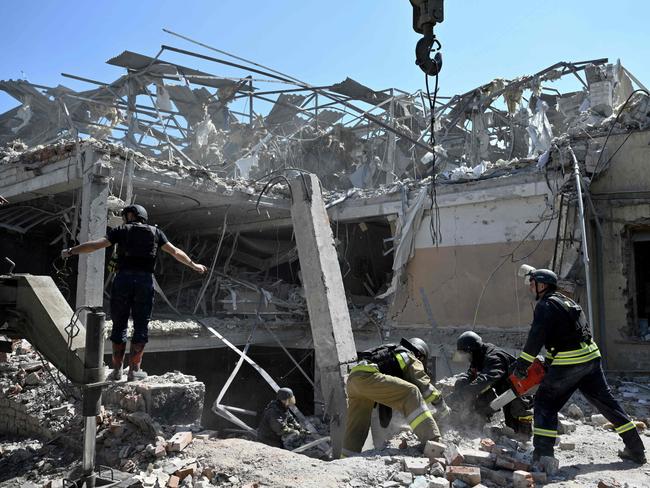
In another bloody day in the two-and-a-half year war, Russian attacks killed at least 18 civilians across Ukraine, while Russian officials said six civilians were also killed in Ukrainian strikes on Russian border regions.
Reuters said it was “devastated” by the loss of its security adviser following the strike at the Hotel Sapphire in the city of Kramatorsk, where six of its crew covering the war were staying.
Ukrainian President Volodymyr Zelenskyy denounced the strike. “For all this, the world must not stop putting pressure on the terrorist state,” he said, referring to Russia following its 2022 invasion of Ukraine.


Reuters said the strike left two of its journalists in hospital, one with serious injuries, while three others were safe.
Ukrainian prosecutors said the hotel was hit by a Russian Iskander missile on Saturday night, local time, with the strike also damaging the building next door.
Kramatorsk — the last major city under Ukrainian control in the Donetsk region — - is often used as a base for aid workers and foreign journalists.
Reuters said the adviser who was killed had “helped keep so many of our journalists safe as they covered events around the world. He was a dear colleague and friend, and we will miss him terribly.”
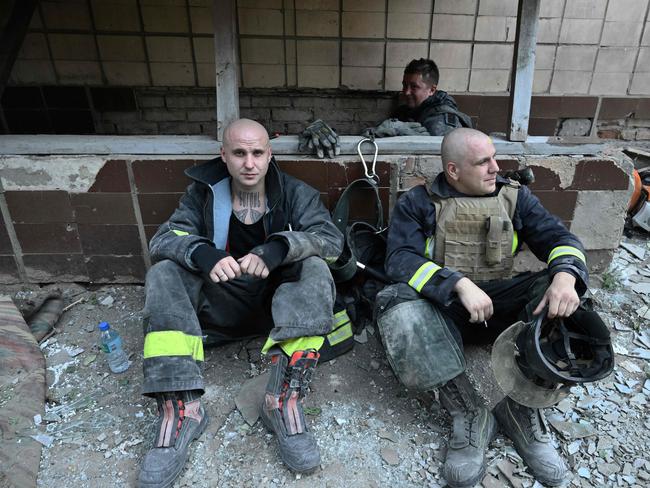
It came as French judicial authorities extended the detention of the Russian-born founder and chief of Telegram Pavel Durov after his arrest at a Paris airport over alleged offences related to the popular but controversial messaging app.
His arrest at the Le Bourget airport outside Paris is the latest extraordinary twist in the career of one of the world’s most influential tech icons.
The detention of Mr Durov, 39, was extended beyond Sunday night, local time, by the investigating magistrate who is handling the case, according to a source close to the investigation. This initial period of detention for questioning can last up to a maximum of 96 hours.
When this phase of detention ends, the judge can then decide to free him or press charges and remand in further custody.

Russia has accused France of “refusing to co-operate” and fellow tech mogul Elon Musk swept to his defence. Durov holds a French passport in addition to other nationalities.
Mr Durov had arrived in Paris from Baku, Azerbaijan, and was planning to have dinner in the French capital, a source close to the case said.
He was accompanied by a bodyguard and a personal assistant who always accompany him, added the source, asking not to be named.
France’s OFMIN, an office tasked with preventing violence against minors, had issued an arrest warrant for Mr Durov in a preliminary investigation into alleged offences including fraud, drug trafficking, cyberbullying, organised crime and promotion of terrorism, another source said.
Mr Durov is accused of failing to take action to curb the criminal use of his platform.
Telegram said in response that “Durov has nothing to hide and travels frequently in Europe.”
“Telegram abides by EU laws, including the Digital Services Act -- its moderation is within industry standards,” it added. “It is absurd to claim that a platform or its owner are responsible for abuse of that platform.”
UKRAINIAN COMMANDER PLEAS FOR ALBO’S HELP
A decorated Ukrainian commander has urged the Albanese government to donate its soon-to-be retired M1A1 Abrams tanks, saying it could be pivotal in countering Vladimir Putin’s forces.
Major Andrii Berezovskyi urged the government to avoid repeating its past decision to scrap 45 military helicopters instead of sending them to Kyiv.
His plea comes as new footage shows Australian Bushmaster vehicles being used by Ukraine in its counteroffensive against Russia.
“They are more manoeuvrable and have new technologies for protection against antitank missile systems, which provides better protection for both personnel and the equipment itself,” Major Berezovskyi told The Australian.
He also criticised the Albanese government’s 2023 decision not to donate the MRH-90 Taipan helicopters, calling it “unwise and unacceptable.”

“If Australia had made a positive decision for us regarding those helicopters, they would have been extremely valuable and would have greatly assisted us in conducting medevacs for wounded soldiers,” Major Berezovskyi said.
“I would like to emphasise for the Australian government that today Ukraine is fighting for democracy and freedom, not only for Ukraine but for the rest of the civilised world.”
Major Berezovskyi, who is in Australia to raise money for Ukraine’s war effort, lauded the Bushmaster protected vehicles provided by Australia under successive aid packages as “great and powerful support”.
“When I first saw the Bushmaster with my own eyes, I felt like, “Yes, we can move forward with them’,” he said.
MOSCOW DEFENDS ‘LARGE’ DRONE ATTACK
Russian air defences shot down 11 Ukrainian drones targeting Moscow, “one of the largest” such strikes ever against the capital, officials said on Wednesday.
“Eleven drones were destroyed” over Moscow and its surrounding region, the defence ministry said according to AFP.
“This is one of the largest ever attempts to attack Moscow with drones,” Moscow Mayor Sergei Sobyanin said.
Sobyanin said in an earlier post that no damage or casualties had been reported. Drone attacks on Moscow are rare, with Russia saying in May it had downed a drone outside the capital, forcing restrictions to be imposed at two major airports in the city for under an hour.
Kyiv has repeatedly targeted oil and gas facilities in Russia since the conflict began in 2022, some hundreds of kilometres from its borders, in what it has called “fair” retaliation for attacks on its energy infrastructure.
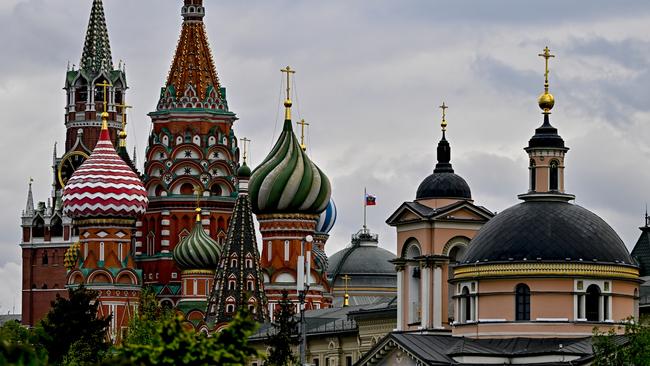
Ukrainian drones attacked an oil storage facility in Russia’s southern Rostov region on Sunday, sparking a large fire, the local governor said.
The blaze in the city of Proletarsk saw 500 Russian firefighters working to put it out.
Earlier this month, Ukrainian President Volodymyr Zelensky praised his forces for hitting oil facilities in Russia, saying the attacks would help bring a “just end” to the conflict.
The drone attacks come as Ukraine mounts an unprecedented cross-border assault into Russia’s Kursk region, where it claims to control more than 80 settlements.
PUTIN INSPECTS SPECIAL FORCES IN CHECHNYA
Russian President Vladimir Putin and Chechen leader Ramzan Kadyrov have inspected Chechen troops and volunteers preparing to fight in Ukraine in Putin’s first visit to the North Caucasus region since 2011.
The surprise trip, reported by Al Jazzera, comes as Moscow fights to push Ukrainian forces out of its Kursk region two weeks after they crossed the border in the largest invasion of Russia since World War II.

“As long as we have men like you, we are absolutely, absolutely invincible,” Putin told soldiers at the Russian Special Forces University, a training school in Chechnya’s Gudermes, according to a transcript on the Kremlin’s website.
Kyiv’s incursion has been an embarrassment for Putin and his army, even as Russian forces continue their steady advances on the front line in eastern Ukraine.
Al Jazzera said Kadyrov, a key Kremlin ally sanctioned by the United States, told Putin at a separate meeting that Chechnya had sent more than 47,000 troops to Ukraine since the start of the war, including about 19,000 volunteers.
UKRAINE BLOWS UP SECOND KEY BRIDGE IN RUSSIA
Russia claims Ukraine used Western rockets to destroy a bridge over the Seym river in Russia’s Kursk region, killing volunteers trying to evacuate civilians.
“For the first time, the Kursk region was hit by Western-made rocket launchers, probably American HIMARS,” Maria Zakharova, spokeswoman for the Russian foreign ministry, said on the Telegram messaging app.
“As a result of the attack on the bridge over the Seym River in the Glushkovo district, it was completely destroyed, and volunteers who were assisting the evacuated civilian population were killed.”
It comes as Ukraine said it had struck a second key bridge in the Kursk region, seeking to disrupt Moscow’s supply routes as Kyiv’s unprecedented incursion on Russian soil stretched through its second week.
“Minus one more bridge,” Ukrainian Air Force Commander Mykola Oleshchuk said on Telegram, publishing an aerial video of a blast tearing through a bridge near the Russian town of Zvannoye.
“The Air Force aviation continues to deprive the enemy of logistical capabilities with precision air strikes,” he said.
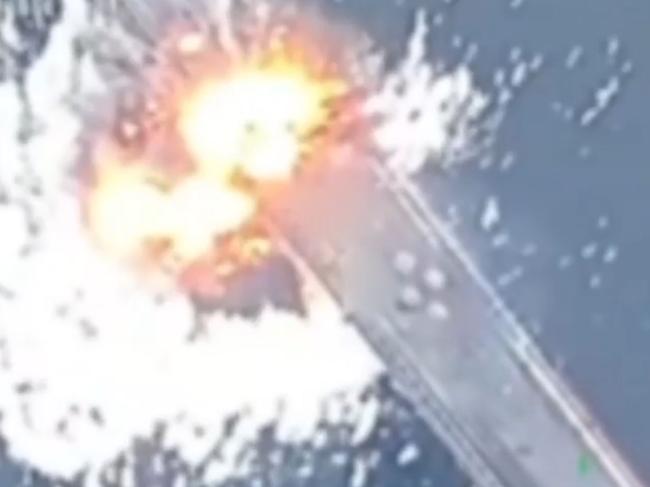
It was unclear when Ukraine carried out the attack.
Oleshchuk did not give a date and Russian military bloggers shared photos of destruction from what appeared to be the same bridge dated Saturday.
Kyiv sent troops and armoured vehicles across the border on August 6, its biggest attack on Russian territory since the Kremlin launched its invasion of Ukraine in February 2022.
On Friday, Ukraine announced it had destroyed a separate bridge in the neighbouring town of Glushkovo.
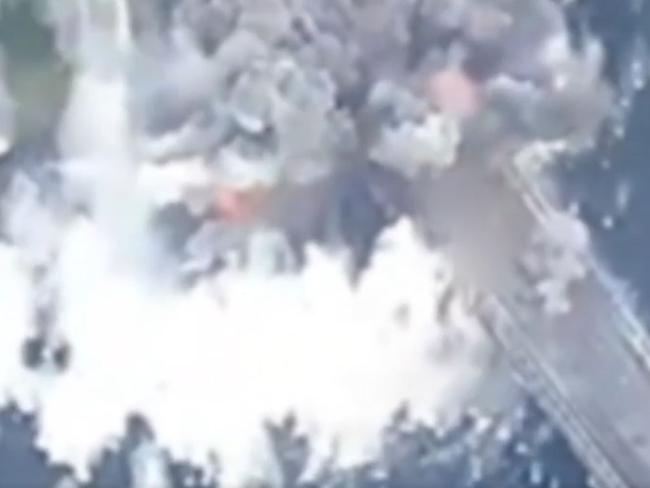
“Our guys are doing a great job in all areas,” Ukrainian President Volodymyr Zelenskyy said of the Kursk region operations in his evening address Sunday.
The Kursk offensive, he added, was aimed at “creating a buffer zone on the aggressor’s territory”, confirming recent comments by senior Ukrainian officials.
But he repeated his appeal for faster delivery of key equipment, addressing Britain, France and the United States in particular.

More Coverage
Read related topics:Russia & Ukraine Conflict




